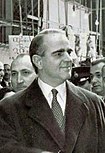
Konstantinos G. Karamanlis, commonly anglicised to Constantine Karamanlis or just Caramanlis, was a four-time Prime Minister and twice President of the Third Hellenic Republic, and a towering figure of Greek politics whose political career spanned much of the latter half of the 20th century.

Parliamentary elections were held in Greece on 7 March 2004. The New Democracy Party of Kostas Karamanlis won the elections, ending eleven years of rule by the Panhellenic Socialist Movement (PASOK). PASOK was led into the elections by George Papandreou, who succeeded retiring Prime Minister Costas Simitis as party leader in February.

Konstantinos A. Karamanlis, commonly known as Kostas Karamanlis, is a Greek politician who served as Prime Minister of Greece from 2004 to 2009. He was also president of the centre-right New Democracy party, founded by his uncle Konstantinos Karamanlis, from 1997 to 2009, and he is currently a member of the Hellenic Parliament.

The New Democracy, also referred to as ND (ΝΔ) by its initials, is a liberal-conservative political party in Greece. In modern Greek politics, New Democracy has been the main centre-right political party and one of the two major parties along with its historic rival, the Panhellenic Socialist Movement (PASOK). Having spent two and a half years in government under the presidency of Antonis Samaras, New Democracy lost its majority in the Hellenic Parliament and became the major opposition party after the January 2015 legislative election.
Georgios Ioannou Rallis, anglicised to George Rallis, was a Greek conservative politician and Prime Minister of Greece from 1980 to 1981.
Tzannis Tzannetakis was a Greek politician who was briefly Prime Minister of Greece during the political crisis of 1989.
Elections in Greece gives information on elections and election results in Greece.

Spyridon Markezinis or Markesinis was a Greek politician, longtime member of the Hellenic Parliament, and briefly the 169th Prime Minister of Greece during the aborted attempt at democratization of the Greek military regime in 1973.

Parliamentary elections were held in Greece on 20 November 1977. After Prime Minister Constantine Karamanlis called for early elections, his New Democracy party suffered a significant loss of power. However, Karamanlis managed to secure an absolute majority in the Parliament. The big surprise was the success of PASOK, whose socialistic rhetoric remained radical. Because of PASOK's success, the Centrists led again by Georgios Mavros lost half of their power. As a result, Andreas Papandreou, PASOK's leader, became a prominent figure in Greek politics. The Communists and the Nationalists managed to amplify their support.

Parliamentary elections were held in Greece on Sunday, 18 October 1981. The Panhellenic Socialist Movement (PASOK), led by Andreas Papandreou, faced New Democracy, led by Georgios Rallis. Papandreou achieved a landslide and PASOK formed the first socialist government in the history of Greece.

National Alignment was a nationalist-conservative Greek political party that contested only the 1977 legislative election, winning 7% of the vote and five seats. It was founded by conservatives who split from Konstantinos Karamanlis and his New Democracy party, who resented Karamanlis moving towards the center and distancing himself from hard-right elements, and alleged that Karamanlis had given too many concessions to the left, in particular by legalizing the Communist Party of Greece and overseeing the imprisonment of the leaders of the 1967–1974 junta. The EP's leader was Stefanos Stefanopoulos, and its deputy leader was Spyros Theotokis. Although the party was not officially royalist, Theotokis was a noted royalist, giving the party somewhat of an association with the monarchist right.
The terms Apostasia or Iouliana or the Royal Coup are used to describe the political crisis in Greece that centred on the resignation, on 15 July 1965, of Prime Minister Georgios Papandreou and the appointment, by King Constantine II, of successive prime ministers from Papandreou's own party, the Center Union, to replace him. Those defectors from the Center Union were branded, by Papandreou's sympathisers, as the Apostates ("renegades"). The Apostasia heralded a prolonged period of political instability, which weakened the fragile post-Civil War order and ultimately led to the establishment of a military regime in 1967.

Parliamentary elections were held in Greece on 19 February 1956. The result was a victory for Constantine Karamanlis and his National Radical Union party by securing the electoral vote despite trailing in the popular vote. It was the first general election in Greece in which women had the right to vote, although women had first voted in a by-election in Thessaloniki Prefecture in 1953 in which the first female MP was elected.

Parliamentary elections were held in Greece on 3 November 1963. They resulted in a narrow victory for the Center Union of Georgios Papandreou after three consecutive victories of Konstantinos Karamanlis and his National Radical Union party and after 11 years, during which the conservative parties ruled Greece.

Parliamentary elections were held in Greece on Sunday, September 16, 2007, to elect the 300 members of the Hellenic Parliament. The leading party for a second term was New Democracy under the leadership of Kostas Karamanlis with 41.83%, followed by George Papandreou and Panhellenic Socialist Movement (PASOK) with 38.10%. New Democracy managed to secure an absolute but narrow majority of 152 out of 300 parliament seats. The populist Popular Orthodox Rally entered the parliament for the first time with 10 seats, while the parties of the left, the Communist Party of Greece (KKE) and the Coalition of the Radical Left (SYRIZA), enjoyed a significant increase in their votes. KKE got 8.15% of the votes and secured 22 parliament seats and SYRIZA got 5.04% of the votes (+1.78%) and 14 seats.

Panagiotis Kanellopoulos or Panayotis Kanellopoulos was a Greek author, politician and Prime Minister of Greece. He was the Prime Minister of Greece deposed by the Greek military junta of 1967-1974.

Parliamentary elections were held in Greece on 4 October 2009. An election was not required until September 2011.


















